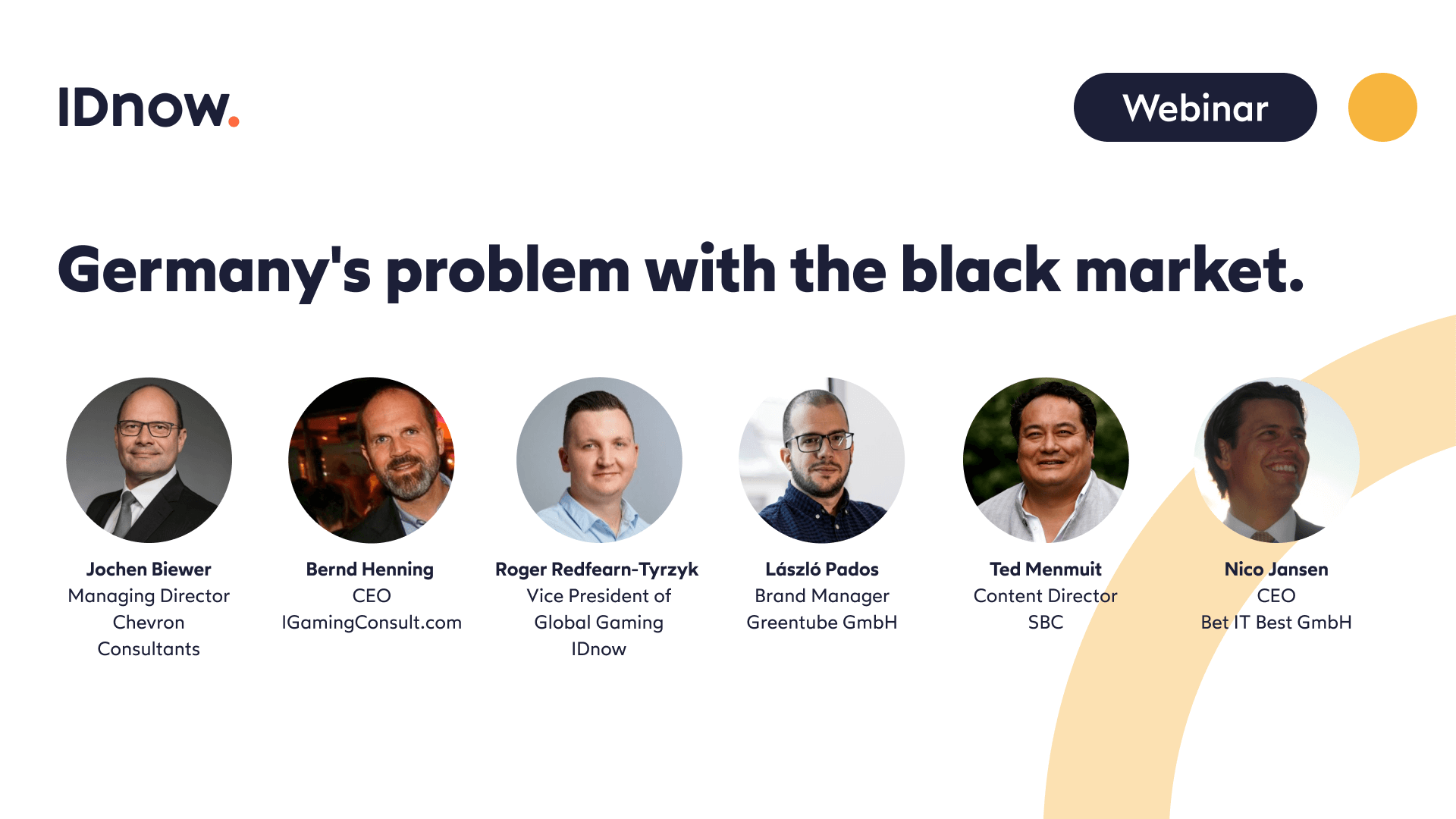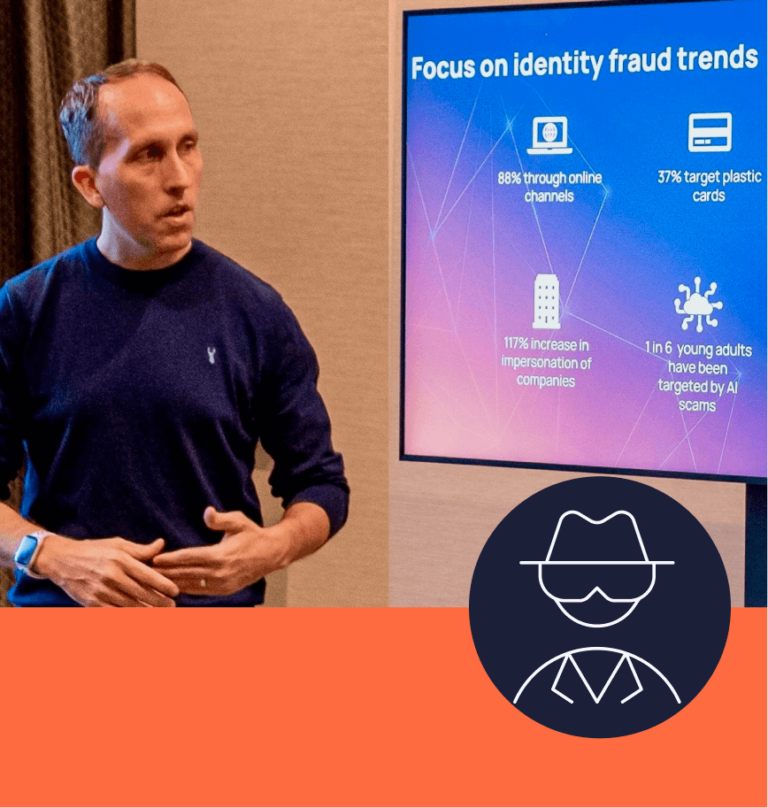Despite recently introduced regulations, gambling on the black market in Germany is still alive and well. We gathered experts from the industry to discuss why that is and what can be done to curb the worrying trend of illegal gambling.
The drop in tax revenue from €55 million to €10 million per month is due to an inhospitable regulatory environment in Germany, according to Nico Jansen, CEO at Bet IT Best GmbH, who was speaking at our recent webinar on black market gambling in Germany.
Since the introduction of the State Treaty on Gambling in 2021, German players have been flocking to either offshore operators, or unregulated black market operators. Why is this happening, and what can be done to stop it?
In the recent IDnow webinar, ‘Germany’s problem with the black market’, we gathered experts from the field, including Ted Menmuir, Content Director at the Sports Betting Community, Jochen Biewer, Managing Director at Chevron Consultants, Bernd Henning at IGamingConsult.com, Laszlo Pados, Brand Manager at Greentube GmbH, Nico Jansen, CEO at Bet IT Best GmbH, and our own Roger Redfearn-Tyrzyk, Vice President of Global Gaming to delve deeper into the subject and explore what operators across the board need to know.
Germany’s problem with the black market.

The current state of gambling regulation in Germany.
Historically, Germany has had a rather complex and fragmented approach to gambling legislation, with individual states retaining considerable autonomy. Recognizing that an outright ban on online gambling was unsuccessful and had allowed offshore operators to flourish, a new State Treaty on Gambling was enacted in 2021 to regulate the market and offer licenses to German operators.
When the Glücksspielstaatsvertrag (GlüStV) was first luanched, it introduced a centralized licensing system for online sports betting and casino games and aimed to unify and modernize the regulation of gambling across the country. A noble cause indeed.
However, while the requirement of operators to have a license opened the market and allowed private operators to break the state monopoly on certain forms of gambling, it also introduced several restrictions and player protection measures, that, some argue, have largely driven players to the black market.
These include:
- Deposit and stake limits
- Identity verification
- Strict advertising guidelines
- Centralized database for monitoring activities
Read more in our blog post, ‘Online Gambling in Germany: regulations, restrictions and ramifications‘.
Online casinos licensed by the national gambling authority (Glücksspielbehörde der Länder, GGL) must enforce a deposit limit of €1,000 per player per month across all operators. This is monitored through a centralized database to check player behavior. To prevent excessive gambling, players are subjected to a €1 stake limit on casino games and a 5-second delay on slot machines. Operators must also pay a 5.3% turnover tax on each bet.
Sportsbook operators face similar restrictions regarding deposit limits. Taxes are even higher, with a whopping 8% tax levied on sports betting. Certain types of betting, such as live betting and fantasy sports, are prohibited.
As pointed out in our webinar, the DSWV report shows that between 2021 and 2022, total sports betting stakes fell from €9.4 billion to €8.2 billion, and as a result, taxes collected fell from €470 million to €433 million, a drop of 13%.
What are the risks of black market gambling?
Perhaps because of the above, the German Betting Trade Association (DSWV) has reported a 65% increase in illicit gambling activities and sports betting activities and is calling for more action against black market activity.
Gambling sites that operate without the necessary licenses from the GGL or use alternate licenses from international authorities such as the Malta Gaming Authority MGA or Curaçao are operating in defiance of the legal frameworks established by the government, and are therefore considered black market.
Consumers who use illegal or unregulated online platforms are doing so at their own risk, as consumer protection standards may not necessarily be enforced, which increases the risk of fraud, a lack of fair play, or responsible gambling mechanisms for players. Illegal gambling operations can also be used for money laundering and other illicit activities.
A lack of accountability and transparency can also contribute to difficulties in tracking financial transactions and investigating illegal activities.
[Are you ready for Euro 2023? Read our blog, ‘5 things gambling operators need to know before Euro 2024.’]
Betting bad: What factors contribute to the growth of illegal gambling?
A lively discussion point from the webinar was what forced law-abiding German citizens to the black market. Participants suggested several reasons.
- Better entertainment: Players are attracted to offshore gambling sites because they offer more games, betting options and bonus offers.
- No limits: There is no pre-set deposit limit, but players are often encouraged to set a daily, weekly, or monthly deposit limit as part of the operator’s responsible gambling strategy. Similarly, there is no €1 stake limit. Players can choose stake size according to preferences and financial capabilities.
- More features: Black market online casinos also offer features such as automatic betting, which spins the slot machine reels a pre-defined number of times without the need to manually click after each spin. There is also no 5-second delay on virtual slots.
- Higher RTP: Due to the high tax rates for German operators, RTPs (return-to-player) on games are much lower, leading to smaller pay-outs on regulated platforms. As players often opt for games with the highest RTPs, they are invariably drawn to the black market.
- Better experience: No deposit and stake limits, no predefined spin duration, more features, and more games can lead to an overall better user experience.
While there are a multitude of reasons for consumers to opt for black market gambling sites, a long and expensive licensing process also means many operators may find it more attractive to be licensed elsewhere.
Although being a licensed operator has its advantages, not least of which is being able to show you are compliant and adhere to fair play and responsible gaming measures, it does not necessarily make financial sense. Revenue is capped due to deposit limits, taxes are high, and the offering is limited as every game needs to be tested and approved by GGL (even if another operator already offers the exact same game).
The challenges, loopholes and regulatory hurdles of the German market.
Since coming into effect, the German State Treaty has proven to be largely ineffective in preventing access to the black market. Attempts at geo-blocking websites are often ineffective, as a recent example from Turkey showed, where one unregulated site was blocked but within minutes had sent a new URL to players via an SMS.
The main tool German authorities have in the fight against the black market is the ability to pressure payment providers to not process payments for illegal operators. However, when one payment method fails, players invariably just switch methods.
Another important factor driving players to the black market is the KYC check. As per KYC requirements, German operators are required to verify players at the registration stage or within 72 hours to weed out fraudsters and prevent underage users from accessing games.
However, the user experience, especially for privacy-conscious Germans can be seen as a hurdle many are simply unwilling to surmount. Few people want to hand over personal details to use a product or service they don’t know much about. Many offshore operators don’t require immediate identity verification, and usually only do so when players withdraw (a lot of) money from the site. In the case of the Malta Gaming market, this is usually north of €2,000.
Challenges faced by regulators.
With a steady decline in tax revenues from legal gambling activities, regulators need to create a more supportive and inclusive environment for players and operators alike.
While the German Betting Association (DSWV) has pledged to work closer with operators to crack down on illegal operators. Industry experts don’t necessarily see this as the right approach, as more bans won’t solve the problem of players being drawn to more attractive offers.
Prohibition and restrictions can drive consumers directly to the black market. As covered in the webinar, high barriers to entry for operators, such as a lengthy licensing process and high taxes on stakes, can be a significant barrier to entry for many operators, while players are often deterred from regulated operators by the monthly deposit and wagering limits, as well as the need to verify their identity before placing a bet.
During the webinar, Bernd Henning of IGamingConsult.com agreed that while steps must be taken to prevent players from using the black market, the main conundrum facing operators is “How can we operate within the confines of the law and still make a profit?”
Does LUGAS help or hinder?
LUGAS, which is Germany’s Interstate Gambling Evaluation System, is used to evaluate the data submitted by operators and ensure deposit limits and other regulations are met. It is mandatory for all online gambling operators to connect to LUGAS.
As a cross-operator database, it includes deposit limits and regulates access to the regulator’s platform. The system enforces a rule that restricts a player to accessing only one platform at a time, coupled with a specific deposit limit. However, the system is not without its detractors, with even the DSWV raising concerns about data protection. A common criticism is that operators themselves have no way of auditing LUGAS, which raises serious concerns about transparency and accountability.
LUGAS appears to be contributing to the growing trend of players turning to the black market. In Denmark, for example, the imposition of a deposit limit led to a significant shift of players to unregulated casinos. However, as soon as this restriction was lifted, players returned to the regulated market. This underlines the importance for regulators to monitor developments in other regulated markets and learn from their experiences with different regulations to effectively navigate the dynamic landscape of online gambling.
The way forward for regulators, operators, and players.
The current landscape of gambling regulation in Germany is a valiant, but perhaps misguided attempt to modernize the industry and strike a balance between consumer protection and market openness. However, ironically, it also appears to be driving users and operators to the black market, which suggests a misalignment with the original goal of player protection. A comprehensive re-evaluation of the entire regulatory process may be necessary to achieve the desired results.
To keep players within the regulated sphere, cooperation with established international regulators like the MGA is essential. Working together to simplify processes and gain a deeper understanding of the market will benefit German regulators, operators, and players alike. For example, the removal of deposit and wagering limits could help to retain players, while the introduction of a game whitelist could streamline the licensing process for operators.
The ongoing discussions within the German regulatory landscape underline the importance of adapting strategies to adjust to shifting trends and market development. Whether this is done by launching a series of consultations with invested stakeholders like what is currently happening in the UK will ultimately be the decision of German regulators and policymakers. What is clear though is that a collaborative and adaptive approach will be key in creating a thriving, regulated gambling industry that addresses the challenges of an attractive black market.
By

Roger Redfearn-Tyrzyk
VP Global Gaming at IDnow
Connect with Roger on LinkedIn
Germany’s problem with the black market.




